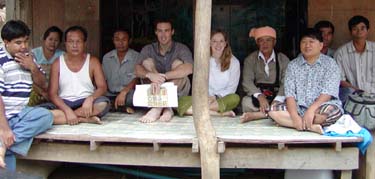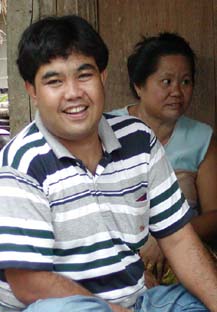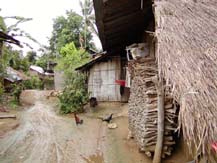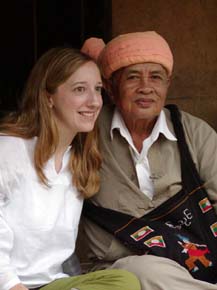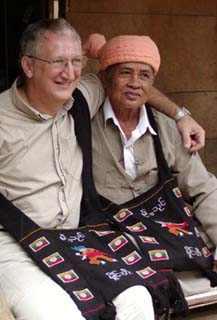|
“Withouta Home” John, Chong, Steve, Neel and I arrived at the village on a rainy July morning hoping to talk to some Shan villagers. Thanks to Steve’s translation, I was able to gain the following insights from a conversation with Sao Kerser. Sao described himself as the head of cultural things in that area for the Shan. Below is an adaptation of our conversation. Read on and learn about the typical hardships of Shan living. FAYE: Where did most of the people in the village come from and what is their ethnicity? SAO KERSER: They are all Shan. They all came over from Northern Burma because the Burmese government confiscated their land. But they cannot get citizenship here in Thailand. If the police catch them, they send them back to Burma. Someone was just caught this morning. FAYE: Do these people come to Thailand with their whole family? SAO KERSER: The husband usually comes over first to look for property and a job and then goes back for the family. FAYE: Is the husband the head of the family? SAO KERSER: Yes unless he dies. Sometimes the Burmese government shoots the head of the family, then the wife becomes the head. FAYE: Why would they shoot the husband? SAO KERSER: The Burmese army uses the Shan men to carry the weapons when they move troops. They just tell the Shan to come. If they don’t go, then they are shot. FAYE: Do the Shan welcome the Shan that come over from Burma? SAO KERSER: Yes, they want to help them. They also have escaped themselves. They are the same people. FAYE: What makes a Shan person a Shan person? SAO KERSER: Mainly speech and the way that they dress. Most of the Shan use this (pointing to his bag) to carry things around. It is called a yam. When they walk through the forest they pick up fruit and put it in their yam. FAYE: Can you tell us about the designs on your yam? SAO KERSER: This is the Shan State Flag. Yellow stands for religion, green stands for land, and red stands for ethnicity. The white circle stands for peace. FAYE: What about your head dress? Is there any significance to it? SAO KERSER: Shan wear different things depending on the preference of the person. [At this point he brought out a calendar with pictures of Shan in traditional dress. He gave this to us.] FAYE: What is the typical dress for women? SAO KERSER: (Pointing to the pictures of the women on the calendar) Women wear long skirts and long sleeved shirts. Like the one you are wearing. FAYE: What are the future aspirations of the Shan? SAO KERSER: We have our own country. But the Burmese are occupying our land right now. (Pulling out the book entitled The Shan Case, Rooting out the Myth of the Golden Triangle, he opened it to page 28, the Panglong Agreement-he gave us this book.) The Panglong Agreement was established Feb. 12, 1947 between the English government and the Shan State, which gave the Shan State independence. For 10 years the Shan peacefully coexisted with the Burmese. However, in 1960 the Burmese came and occupied the Shan territory. FAYE: What is the most difficult thing about being Shan? SAO KERSER: When the Burmese came and occupied the Shan State, they killed men, raped women, and stole anything the Shan had. FAYE: Has it been difficult to maintain your identity as a Shan person during all of these trials? SAO KERSER: Yes, very hard. The police keep coming and taking people back to Burma. When we are able to make it to Thailand, we find it very difficult to make a living because we will get caught. Another problem is that the children cannot get medical care in Thailand without birth certificates. Most children are born in the homes and not in the hospitals. Also, children do not go to public school because they are not registered. FAYE: How do the children get their education? SAO KERSER: They must be taught in the homes. Actually, children are allowed to attend public schools up to the fourth grade. FAYE: You mentioned how the children receive education, but how do they receive medical care? SAO KERSER: It is all done under the table. The families must pay a lot of money for the care they receive. FAYE: You mentioned hardships in the areas of work, education, and medical care. Can you think of any other hardships facing the Shan? (Another MAN in the room responds): Yes. We cannot own property. This is the hardest thing for us, not having property. Once we escape the Shan State and come here, we feel as if we are having everything ‘squeezed out’ of us. If I go back to Burma, the Burmese government will require me to carry weapons for the army. But if I stay here, then I ‘have no place to sleep.’ I do not have a bed. I do not have a home. Even if I did go back to Burma and work for the army, they would rape my wife· ·”The Thai say I am Burmese, but the Burmese say that I am Shan. So where do I go?” ·”In Burma I have a garden, rice fields. I have land, water buffalo. I have good water. The weather is good. I have all these things, and that is why I want to go back. Now my fields have been taken, my buffalo killed. All my things are in the hands of the Burmese right now.” (Sao Kerser pulled out two English documents from the Shan States Army Central Committee entitled Statement 1/99 and The Narcotic Drug Problem and the Shan States People. He gave them to us.) MAN: (pointing to the documents) If we go back to Burma, we will be forced to plant heroine. FAYE: Does the Burmese government force you to do this? MAN: Not really. The Burmese soldiers force us to plant it and they take it and sell it. FAYE: You mentioned that you felt ‘squeezed’ by the Thai government. How do you preserve your culture? SAO KERSER: We preserve our culture through the celebration of the holiday on February 7th, similar to your independence day. We talk about history and we have a special meal together. We celebrate our ethnicity. We also celebrate on February 12th. This marks our independence as recorded in the Panglong Agreement. However, we are not actually allowed to celebrate our ethnicity on February 7th because the Burmese government will not allow it. They do not want the new generation to know about the freedom found in the Panglong Agreement. As of twenty years ago the Burmese military let us celebrate on the 7th under a different name. So we can celebrate, but the children will not know why we are really celebrating. [This interview was conducted on July 6th, 2002.]
|
|



 This man is dressed in authentic Shan dress. This script above and below the man states, “Greetings from the Shan State”.
This man is dressed in authentic Shan dress. This script above and below the man states, “Greetings from the Shan State”.